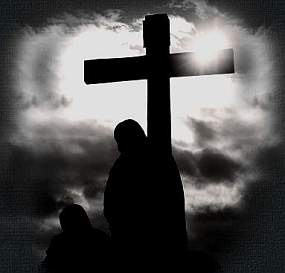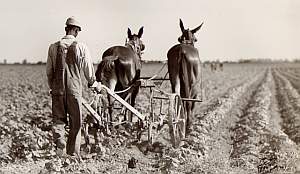When I consider how things started going awry in the American Church, time and again it comes back to one simple word.
Like too many negative perspectives on life, that word is more commonly defined by what it is not instead of what it is. You see this negating effect when people try to analyze Philippians 4:8:
Finally, brothers, whatever is true, whatever is honorable, whatever is just, whatever is pure, whatever is lovely, whatever is commendable, if there is any excellence, if there is anything worthy of praise, think about these things.
When when we break down that passage, we tend to read it like this:
Finally, brothers, whatever is not false, whatever is not despicable, whatever is not unjust, whatever is not corrupted, whatever is not ugly, whatever is not contemptible, if there is no hint of mediocrity, if there is anything impervious to critique, think about these things.
We end up defining the good as “not bad,” therefore losing all the concepts that attach themselves to the positive idea of what is good.
And so it is with this one simple word.
We find the negation of that word in a marital affair. We uncover its opposite in higher criticism of the Bible. We hear its voice in the followers of Korah. We see its absence in Ananias and Sapphira. And we discover its lack in this lesser known parable:
“What do you think? A man had two sons. And he went to the first and said, ‘Son, go and work in the vineyard today.’ And he answered, ‘I will not,’ but afterward he changed his mind and went. And he went to the other son and said the same. And he answered, ‘I go, sir,’ but did not go. Which of the two did the will of his father?” They said, “The first.” Jesus said to them, “Truly, I say to you, the tax collectors and the prostitutes go into the kingdom of God before you.”
—Matthew 21:28-31
The simple word?
Commitment.
It saddens me that we tend to understand commitment by its absence rather than its presence. Lack of commitment gets more press than commitment, even in our churches.
About the only place you hear of commitment in its positive sense is in the military. No matter what you might think of war—any war—those who come back home in flag-draped coffins modeled commitment all the way to death. Their commitment can never be disputed.
It’s telling that those who complain the most about our soldiers are the ones who least understand commitment. But ask a soldier; they’ll always relate the same positive traits that undergird their understanding of commitment:
- Belief in a higher truth worth dying for
- Submission to authority
- Love of others above love of self
Do we know any other group of folks that should be modeling those traits?
From having been a church watcher now for many years, I believe whatever sense of commitment we once had in the American version of the Body of Christ has largely evaporated. It gives me no peace to say that.  Our lack of commitment may be the sole reason for our ineffectiveness in light of the world’s onslaught.
Our lack of commitment may be the sole reason for our ineffectiveness in light of the world’s onslaught.
Do we believe that the higher truth of the Gospel is worth dying for? Who speaks with that kind of passion anymore? John Knox once prayed, “Give me Scotland or I die!” Is that the kind of prayer you hear uttered in your church on Sunday?
Why not?
What else can the following verse possibly mean?
And they have conquered him by the blood of the Lamb and by the word of their testimony, for they loved not their lives even unto death.
—Revelation 12:11
Or this one?
As it is written, “For your sake we are being killed all the day long; we are regarded as sheep to be slaughtered.”
—Romans 8:36
It extends to a proper respect for authority, too. While nearly every Christian bristles at the mere subject of authority and submission, it’s not the griping about the authority of church leaders and submission to them that troubles me as much as the truth that we can’t seem to grasp the authority of Christ and submission to Him.
We would do well to remember the verse that comes before the Great Commission:
And Jesus came and said to them, “All authority in heaven and on earth has been given to me. Go therefore and make disciples of all nations, baptizing them in the name of the Father and of the Son and of the Holy Spirit, teaching them to observe all that I have commanded you. And behold, I am with you always, to the end of the age.”
—Matthew 28:18-20
We go for no other reason than Christ has all authority in heaven and on earth. He says, we go. How many soldiers died on the battlefield knowing their commander ordered them to be cannon fodder? Plenty. But they went anyway. It may even mean our Commander asks us to die as cannon fodder so that the lost of the world may come to saving knowledge of Jesus Christ.
When the Centurion approached Jesus to ask that the Lord heal his slave, he said this:
“Lord, I am not worthy to have you come under my roof, but only say the word, and my servant will be healed. For I too am a man under authority, with soldiers under me. And I say to one, ‘Go,’ and he goes, and to another, ‘Come,’ and he comes, and to my servant, ‘Do this,’ and he does it.”
—Matthew 8:8b-9
That centurion not only recognized the position of authority, but he correctly states that submission to authority allows the authority to have his way—to the betterment of all.
Is our submission to Christ’s authority allowing or preventing Him from having His way? We should not be so arrogant to think that the Lord would not remove us from the battlefield should we continue to defy His commands. Consider King Saul, for instance. And remember, Christ’s court-martial lasts for an immensely long time.
All this disregard for authority occurs because we love ourselves more than the authority or the higher truth the authority represents. Sadly, as the centurion notes, that self-love may damn everyone. Going AWOL at the worst possible moment may mean others suffer needlessly, the entire platoon wiped out because their cover gunner sneaked away.
Look at our society. Have we Christians gone AWOL? I posted a few days ago about people who took out sub-prime loans who now face the loss of their homes as the sub-prime mortgage sector collapses. I was astonished how many commenters immediately jumped on those folks, claiming they got what they deserved.
IF we believe the Gospel, and IF we submit to the authority of Christ, IT MATTERS LITTLE what the circumstances are. Love of our pronouncements of superiority DOES NOT trump Christ and His Gospel.
Which of us has done it all right? None. Are we not all fools for Christ? Shouldn’t our practice make the world sit up and wonder at our folly? Or is our rightness more important than love?
A hard word doesn’t even need to have all the words in place to be hard. Consider this:
We American Christians talk about __________ , but we show little commitment to making it happen.
What can go in that blank?
- Godly community?
- Evangelism?
- Simple living?
- Justice?
How many words and phrases can fit into our commitment blank?
Earlier, I noted that we tend to think of positive concepts in terms of what they are not, rather than what they are. Perhaps I’ve spent too much of this post falling prey to that same error.
So in the end, I’ll turn it around.
What does real commitment look like in the Body of Christ? When you hear the word commitment, what do you see in the Gospel that reflects positive commitment? How do we achieve that commitment in a positive way so we no longer talk about it, but live it?
And finally, what ungodly systems must we be willing to face in order to make that commitment to Christ and His Body bear fruit?
Something to think about this weekend.
 It’s the question of whether we see ourselves as sinners or saints.
It’s the question of whether we see ourselves as sinners or saints.
 He is steady, “faithful,” always in his accustomed place (like the old field), conservative, and something of a landmark in the little church. But he is fruitless. The curse of such a life is that it is fixed, both in size and in content. To be has taken the place of to become. The worst that can be said of such a man is that he is what he will be. He has fenced himself in, and by the same act he has fenced out God and the miracle.
He is steady, “faithful,” always in his accustomed place (like the old field), conservative, and something of a landmark in the little church. But he is fruitless. The curse of such a life is that it is fixed, both in size and in content. To be has taken the place of to become. The worst that can be said of such a man is that he is what he will be. He has fenced himself in, and by the same act he has fenced out God and the miracle. Our lack of commitment may be the sole reason for our ineffectiveness in light of the world’s onslaught.
Our lack of commitment may be the sole reason for our ineffectiveness in light of the world’s onslaught.